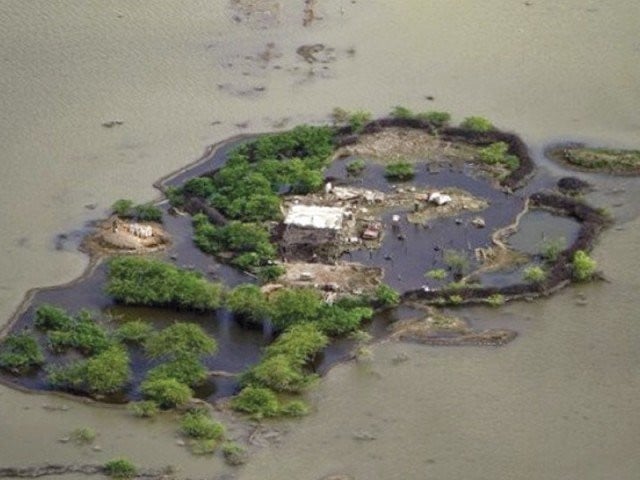
By asking the correct questions, the government can better prepare for the coming climate conference

After formally inaugurating the event, Zahid Hamid, the former federal minister for climate change, highlighted the developments taking place at the Ministry of Climate Change some of which include: the ratification of Paris climate agreement, the preparation and subsequent submission of Intended Nationally Determined Contributions (INDC), adoption of the 2030 Agenda as the national development agenda, approval of the Climate Change Bill and National Forest Policy, establishment of Pakistan Climate Change Authority, launch of Green Pakistan Programme, and the declaration of Astola island as Pakistan’s first Marine Protected Area.
Hamid argued that these developments could be propagated at COP23 to highlight Pakistan’s preparedness to combat climate change and showcase its high vulnerability to the phenomenon.
The session was moderated by Dr Tariq Banuri, the executive director of Global Change Impact Studies Centre, who told the room that the Paris Agreement was an achievement as it convinced all nations to tackle climate change. "The impacts of climate change are prevalent in Pakistan and we are likely to suffer a great deal because of that. When it comes to mitigation, we talk about less emissions but we should join hands for a common outcome," he said.
The INDCs were the most discussed issue at the session as it highlights substantial increase in carbon emissions from 405 million tons of CO2 (current level) to 1603 million tons of CO2 by 2030; reducing carbon emissions by 20 per cent (subject to availability of almost US $40 billion); and demand for USD7-14 billion per annum to cater to adaptation needs from 2010-2050.
Shah Ghulam Qadir, the speaker of Azad Jammu and Kashmir (AJK) Assembly, revealed that after the 18th amendment provinces are not willing to take up the issue of climate change. On the issue of deforestation in AJK, he said "When AJK was liberated in 1947, its forest cover was 48 per cent but now only 9 per cent is left, because we have no alternatives to offer to communities when we ask them to stop the brutal logging of existing forests for fuelwood and other purposes." He added, "We must protect our forests."
While sharing his views on changing weather patterns, Shah Ghulam Qadir said, "AJK had never experienced monsoon rains before but now due to temperature rise the monsoon season has shifted upwards, which is leading to landsliding in the region." Calling for innovative solutions to conserve water, forests and glaciers, he warned that Pakistan will get in a difficult situation.
Shafqat Kakakhel, a former diplomat who currently serves as the chairman at Sustainable Development Policy Institute, warned the government against installing coal power plants, which will increase its emissions. "Every Megawatt produced from coal carries a lot of air and water pollution. Increase in emissions will put us in a difficult position."
Dr Pervaiz Amir, the director of Pakistan Water Partnership, also expressed concern over the fact that Pakistan has embarked upon a destructive development agenda by generating electricity from coal that will hike the emission level by 8-10 per cent. "The predicted temperature rise of 5-9 degrees Celsius will occur not by the end of this century but within 25-30 years’ time," he warned.
When some ‘experts’ stated that the developed world cannot stop Pakistan from relying on coal because they themselves have developed through it, the AJK speaker refuted the stance and urged to invest in hydel energy, as projects such as Neelum Jhelum power plant, Kohala hydel power project and others can be the solution to Pakistan’s energy crisis.
Meanwhile, Syed Abu Ahmed Akif, the secretary of Ministry of Climate Change informed the gathering that coal is now a provincial issue after the 18th amendment.
China, the world’s biggest carbon polluter, has reduced the amount of planned coal power capacity in January 2017 to 570 Gigawatt, down from 1090 GW where it stood a year ago. In the renewable energy sector, China has dominated the world surpassing US as the largest producer of renewable energy, as its solar capacity rose to 77.42 GW in 2016.
Currently, Pakistan is ranked 7th in the list of top ten countries most vulnerable to climate change and it will remain here unless the National Disaster Management Authority is restructured as an adaptation agency. The list of recommendations also includes: capacity building of stakeholders; financial space for adaptation and mitigation; strengthened role of civil society; strengthening of local communities for climate action; raising the level of ambition to limit global temperatures to pre-industrial levels; and most importantly, changing the national agenda on climate change from ‘should’ to ‘will’.
Before Pakistan goes to COP23, it should take care of the following:
Reconsidering the policy of reliance on coal for energy generation, as venturing into coal-fired power plants makes the country further vulnerable to irreversible climatic shocks that can cause embarrassment at the international level.
Pakistan’s INDC says it needs USD 40 billion by 2030 to reduce emissions by 20 per cent but the option of co-financing is not explored, despite the fact that other countries have committed to co-finance their INDCs
With Pakistan getting affected from glacial lake outbursts, flash floods, sea level rises, storms and cyclones, the policy-makers should come up with tangible projects so that international financial institutions such as Green Climate Fund, Adaptation Fund, Global Environment Facility, can fund it.
Instead of beating drums of high climate vulnerability and poor resilience, Pakistan should attempt to showcase its successes surrounding adaptation and mitigation, thereby leading to technology transfer, greater climate funding and climate action.
By asking these questions, the government can better prepare for COP23, so that people at the highest risk from catastrophic climatic impacts can be saved. The choices we make shall determine the fate of our country.
A quote erroneously attributed to Syed Abu Ahmed Akif, the secretary of Ministry of Climate Change has been removed from the story.